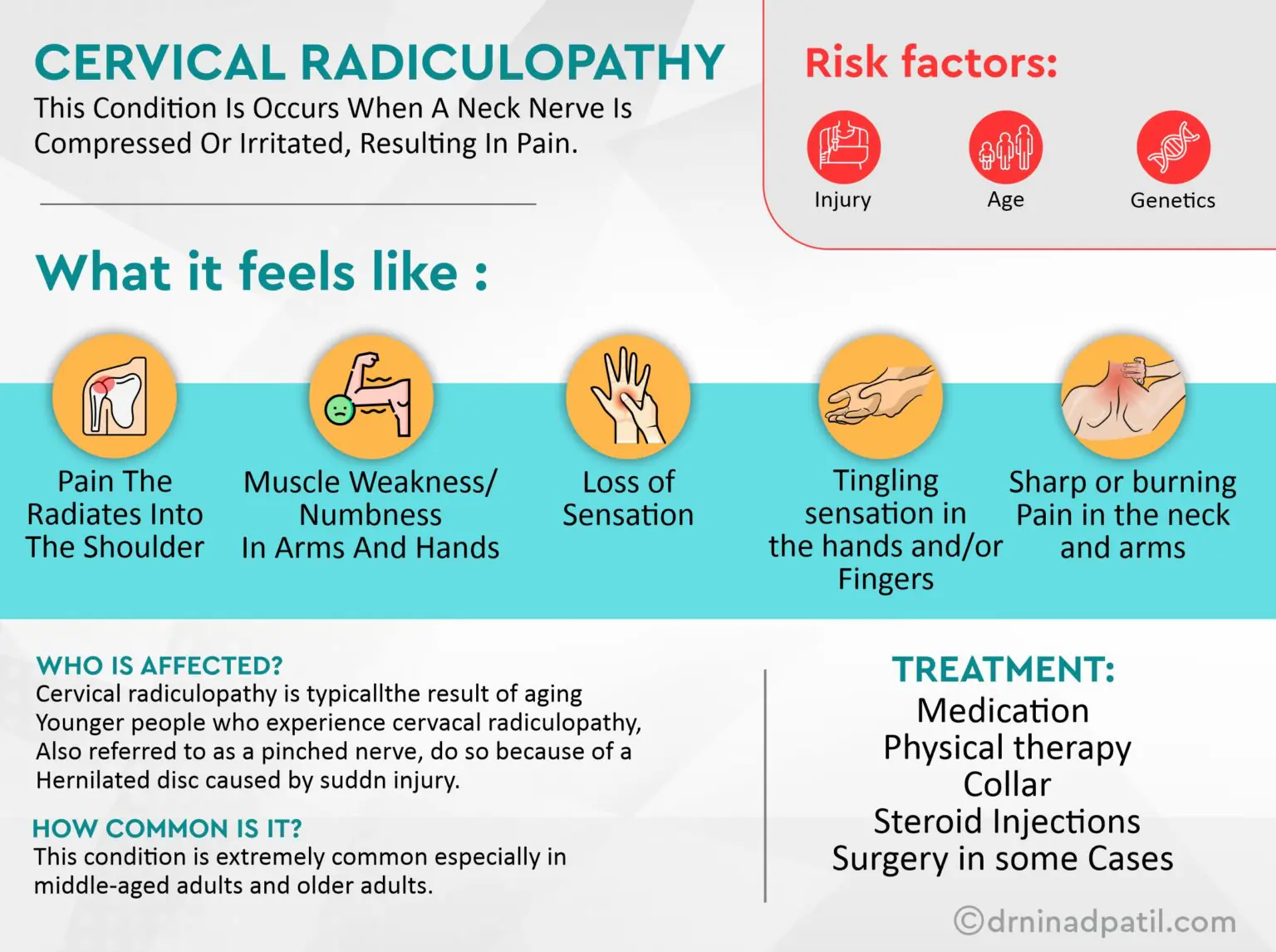
Cervical Radiculopathy Treatment in Pune and PCMC
What is Cervical radiculopathy?
Cervical radiculopathy occurs when a nerve in the neck is compressed, causing pain that radiates to the arm, hand, and fingers. Individuals may experience symptoms like numbness, tingling, and weakness. Seeking early Neck Pain Treatment in Pune can help alleviate these issues and prevent further complications.
Risk factors:
- Injury: A sudden injury to the neck, such as a car accident or fall, can damage the discs, vertebrae, or ligaments in your spine and compress a nerve root.
- Age: The risk of cervical radiculopathy tends to increase with age. Some estimates suggest that this risk peaks in a person’s 40s or 50s because the discs in your spine naturally degenerate over time, becoming thinner and less flexible.
- Genetics: Some people may be more likely to develop cervical radiculopathy because of their genes.
Symptoms of Cervical radiculopathy :
- This Pain That Radiates Into The Shoulder: The pain from a compressed nerve in the neck typically starts in the neck and radiates into the shoulder and arm, following a specific path depending on the nerve root involved. The pain may be sharp, burning, or aching.
- Muscle Weakness/Numbness In Arms And Hands: You may feel weakness in the muscles of your arm and hand on the affected side. This weakness may make it difficult to grasp objects, lift your arm, or perform other daily activities.
- Loss of sensation: In some cases, you may also experience a loss of sensation in your arm and hand. This can make it difficult to feel objects or changes in temperature.
- Tingling sensation in the hands and/or Fingers: You may feel a tingling or prickling sensation (pins and needles) in your hand or fingers. This is often described as a sensation of tiny bubbles running under your skin.
- Sharp or burning Pain in the neck and arms: Pain from a pinched nerve can be sharp and stabbing, or it can be a burning pain. The pain may get worse with certain neck movements, such as coughing, sneezing,
What Causes Cervical radiculopathy ?
- Degenerative disc disease
- Herniated disc
- Bone spurs (osteophytes)
- Spinal stenosis
How Common Is It?
This condition is extremely common, especially in middle-aged adults and older adults.
Treatment For Cervical radiculopathy
1. Medication :
In some cases, stronger medications such as prescription-strength NSAIDs, muscle relaxants, or even short-term opioid pain relievers may be prescribed.
2. Physical Therapy:
Techniques such as massage and ultrasound can target discomfort. Gentle stretches can help relieve stiffness and improve flexibility.
3. Collar :
Soft Cervical Collar: This padded brace can provide short-term relief by limiting neck movement and allowing muscles to rest.
4. Steroid Injections:
For severe pain, an injection of anti-inflammatory medication (corticosteroid) may be given near the affected nerve root to reduce inflammation and provide targeted pain relief.
Who Is Affected?
Cervical radiculopathy is typically the result of aging Younger people who experience cervacal radiculopathy, Also referred to as a pinched nerve, do so because of a Hernilated disc caused by sudden injury
When do you need to consult a doctor for cervical radiculopathy treatment in Pune and PCMC?
The first line of treatment for cervical radiculopathy is usually over-the-counter pain relievers and rest. But if the above-mentioned symptoms, like tingling sensations, muscle weakness, and neck pain, continue for several days even after physical therapy and rest, you need to consult the best spine surgeon in Pune and PCMC to get the best cervical radiculopathy treatment.
If symptoms like neck pain, tingling, or muscle weakness persist even after rest and therapy, it’s important to seek expert Neck Pain Treatment in Pune, PCMC for accurate diagnosis and care.

